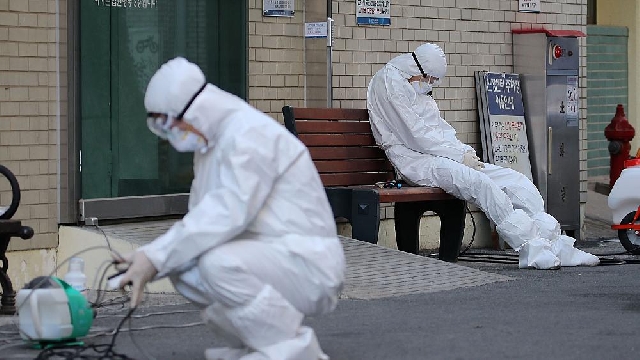Coronavirus: Worst-hit countries boost containment efforts
 countries are intensifying their efforts to contain the deadly coronavirus
countries are intensifying their efforts to contain the deadly coronavirus
The worst-hit countries are intensifying their efforts to contain the deadly coronavirus as the number of cases globally surpassed 80,000.
In South Korea, infections have risen again, taking the total to 977. Americans have been warned against all but essential travel to the nation.
Italy and Iran are both battling to contain outbreaks of the virus.
In Japan shares slumped on Tuesday, reacting to a global plunge on Monday sparked by fear of further outbreaks.
Wall Street and London had both suffered big drops.
The World Health Organization said on Monday the world should do more to prepare for a possible pandemic - a situation where an infectious disease spreads easily between people in many countries.
The WHO said it was too early to label the outbreak as such, but countries should be "in a phase of preparedness".
More cases of the virus, which causes respiratory disease Covid-19, continue to emerge, with the vast majority still in China. The proportion of infected people who die appears to be between 1% and 2%, although the WHO cautions that the mortality rate is not known yet.
What's the latest from China?The Chinese government has announced a ban on the consumption of wild animals and a crackdown on the hunting, transportation and trade of prohibited species, state media say.
It is thought that the outbreak originated at a market in the city of Wuhan, Hubei province, selling wild animals.
China also said it would postpone the annual meeting of the National People's Congress next month, to "continue the efforts" against the coronavirus. The body, which approves decisions made by the Communist Party, has met every year since 1978.
On Monday, the country reported 508 new infections, compared with 409 on Sunday. The bulk of the new cases were in Wuhan.
The death toll in China rose by 71 to 2,663. More than 77,000 people in the country have been infected.
The state-run Global Times reported that scientists had made progress on developing an oral vaccine, with a professor at Tianjin University taking four doses with no side effects.
But experts warn that until full clinical trials have taken place it is unclear how safe or effective the vaccines will be and it could still be months before they can be made widely available.
Hong Kong has extended school closures again, this time up to 20 April.
What about other countries?In South Korea, 10 people have now died after contracting the virus.
Many of the people infected are members of the secretive religious sect known as the Shincheonji Church of Jesus. Health authorities have now been given the details of a quarter of a million members to check they have no symptoms.
President Moon Jae-in has visited the worst-hit city of Daegu. He said time was of the essence in controlling the virus and announced further resources for the region, but also faced protesters demanding more masks.
The head of the Daegu Doctors' Association issued an emotional appeal for more doctors, saying those on duty were passing out with exhaustion or becoming infected themselves, given the overwhelming number of patients.
Japan on Tuesday urged companies to introduce staggered working hours and teleconferencing to prevent the spread of the virus, the country's NHK broadcaster reported.
Japan has now confirmed more than 850 infected people, most of them on the quarantined Diamond Princess cruise liner.
NHK also reported a fourth death among the ship's passengers.
Italy has the largest number of cases in Europe, 231, and announced a series of drastic measures over the weekend to try to contain the outbreak.
In the regions of Lombardy and Veneto, a lock-down is in place in several small towns. For the next two weeks, 50,000 residents will not be able to leave without special permission.
A number of top-flight football matches will be played in empty stadiums next weekend.
Seven people have died.
An Italian doctor from the Lombardy region has tested positive for the virus while on holiday in Tenerife, Spain, and has been put in quarantine.
Three more deaths have been recorded in Iran, state media say, raising fatalities there to 15. The country has introduced school closures and the daily disinfecting of the Tehran underground system.
The United States plans to spend $2.5bn (£1.93bn) fighting the coronavirus, with funds for quarantine, vaccine research and aiding affected states, US media reported. There are 53 cases in the US so far.
What did the WHO say?WHO chief Tedros Adhanom Ghebreyesus told reporters on Monday that the number of new cases in recent days in Iran, Italy and South Korea was "deeply concerning".
However he added: "For the moment we are not witnessing the uncontained global spread of this virus and we are not witnessing large scale severe disease or deaths.
"Does this virus have pandemic potential? Absolutely, it has. Are we there yet? From our assessment, not yet."
What are the symptoms?The main signs of infection are fever (high temperature) and a cough as well as shortness of breath and breathing difficulties.
What should I do?Frequent hand washing with soap or gel, avoiding close contact with people who are ill and not touching your eyes, nose and mouth with unwashed hands can help cut the risk of infection.
Catching coughs and sneezes in a tissue, binning it and washing your hands can minimise the risk of spreading disease.
What does 'pandemic' mean? A pandemic is the worldwide spread of a new disease The H1N1 (swine flu) outbreak, which killed hundreds of thousands of people, was declared a pandemic by the WHO in 2009 The WHO no longer formally labels an outbreak of disease a "pandemic" but says the term may be used "colloquially" Its advice to countries - to limit the infections while preparing for wider spread - remains the sameSource: BBC
Trending News

NDC petitions Speaker on missing BVDs at EC
13:21
Clear indication defeat staring NPP in the face - NDC
10:58
Adu Boahen’s murder: Police arrest house help who was in possession of deceased’s personal belongings
08:54
Bawumia jets to Italy for bilateral discussions with Pope
13:14
Train crash: I'd be asking some serious questions were I president – Mahama
07:02
We're prioritising solar, wind, hydro power for energy growth – Akufo-Addo
08:12
Dumsor must stop demo part 2: We’ll choose how we demonstrate and who to partner – Franklin Cudjoe replies Yvonne Nelson
10:17
Struggle for next NDC leader'll make Mahama gov't lose focus if he wins 2024 polls - Afenyo-Markin says Bawumia 'better' option
14:16
Dec. 7 polls: Prioritise national interest over politics – Head of Civil Service tells staff
08:18
Naana Jane embodies authority and authenticity - Joyce Bawah insists
12:58



